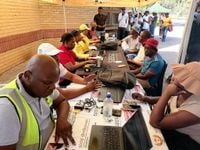Millions of South Africans rely on Sassa social grants each month, and while payments for May 2025 are scheduled to begin this week, some recipients may not receive their funds unless they take immediate action. The South African Social Security Agency (Sassa) confirmed that payments will go ahead starting Tuesday, May 6, 2025. However, a targeted verification campaign may delay payouts for specific beneficiaries.
Sassa will disburse grants on the following dates:
- Older Persons Grant – Tuesday, May 6, 2025
- Disability Grant – Wednesday, May 7, 2025
- Children’s Grants – Thursday, May 8, 2025
Despite the schedule, Sassa warned that some recipients will not receive their grants on time due to ongoing identity checks. Sassa launched a verification campaign in late April to strengthen the integrity of the grant system. This campaign targets individuals who use alternative forms of identification instead of a 13-digit South African ID number. These recipients must now verify their details in person at a Sassa office.
“We’re asking beneficiaries not to panic,” said Sassa spokesperson Paseka Letsatsi. “This is an ongoing process, and only a specific group will experience delays.” The agency urges these affected recipients to visit their nearest Sassa office and submit the correct identification. Once verified, Sassa will update their records and resume payments.
Sassa has made it clear: failure to comply will have serious consequences. Beneficiaries who ignore verification requests risk temporary suspension of their grants. Continued non-compliance could result in complete grant termination. “Once these clients visit Sassa offices, we’ll review their details and ensure their ID numbers are properly captured,” Letsatsi explained.
This verification campaign forms part of a broader crackdown on fraud within the social grant system. Sassa has begun flagging individuals through a bulk means test, identifying those whose bank accounts reveal undisclosed income. These recipients may have misrepresented their financial situation when applying for grants. “Social grants can be reviewed at any time if there’s reason to believe a beneficiary’s circumstances have changed,” Sassa stated.
The agency plans to intensify monthly reviews throughout the 2025/2026 financial year. Each month, Sassa will identify clients for personal detail verification to maintain accuracy and prevent abuse of the system. If Sassa contacts you or flags your account, take the following steps immediately:
- Visit your nearest Sassa office in person.
- Bring a valid 13-digit South African ID.
- Update your personal or financial information if anything has changed.
These steps will ensure that your grant continues without interruption. The verification campaign may seem inconvenient to some, but it plays a critical role in protecting the integrity of South Africa’s social welfare system. With rising demand for financial assistance, Sassa must ensure that grants reach the right people, especially the elderly, disabled, and children who depend on this support.
As of May 6, 2025, about 20,000 social grant beneficiaries will not receive their payments this week due to the verification drive by Sassa. The agency says the delays mostly affect people who use forms of identification other than an ID, as part of efforts to prevent fraud in the social security system. Grants are scheduled to be paid from today, but affected beneficiaries will need to verify their identities before Sassa pays them.
“Once a beneficiary has been successfully verified, we do not anticipate it to take more than a week for them to receive their grant money,” said Letsatsi. He added that Sassa had sent out SMS messages to notify affected people using the contact numbers stored in its system. “Unfortunately, we cannot guarantee that everyone will receive the message since some of our beneficiaries do not always come and update their numbers,” he said.
The verification process aims to reduce errors and ensure that only eligible beneficiaries get social assistance. The agency currently pays grants to about 28 million people every month. A second group of beneficiaries flagged for verification this month includes those receiving income into bank accounts they did not tell Sassa about. These people were identified through a means test designed to detect unreported income that could affect eligibility.
“In the 2025/2026 financial year, we will intensify our measures to ensure eligibility by regularly identifying clients on a monthly basis so that they come to our offices to verify their personal details,” said Letsatsi. He added that attempts to improve security would also involve tackling possible wrongdoing by Sassa officials. About 11 Sassa officials are currently facing over 1,000 charges in court for alleged fraud worth more than R260 million.
“This process will also look inwardly and identify any possible collusion by Sassa officials, working in cahoots with the outside world to cheat the system and effectively steal grant money meant for the poor,” Letsatsi said. When asked whether Sassa conducted lifestyle audits on its employees, Letsatsi responded: “Not regularly, but this is something that the organisation is working to improve on.”
Sassa said the new measures were part of a broader strategy to improve record-keeping, prevent fraud, and ensure that grants reach those who need them most. If you’ve been contacted by Sassa or suspect your grant is at risk, visit your nearest Sassa office immediately with your 13-digit South African ID. Complete the verification process to restore access to your grant. Act urgently—failure to verify your ID can lead to suspension or full lapsing of your grant.
For further assistance, there are more than 400 Sassa regional and satellite offices nationwide, open Monday to Friday from 08h00 to 17h00. Before visiting, beneficiaries can contact Sassa through various channels including a toll-free number and WhatsApp.
Stay informed and ensure you take the necessary steps to secure your grant. The verification campaign is crucial for maintaining the integrity of South Africa’s social welfare system, ensuring that assistance reaches those who truly need it.

